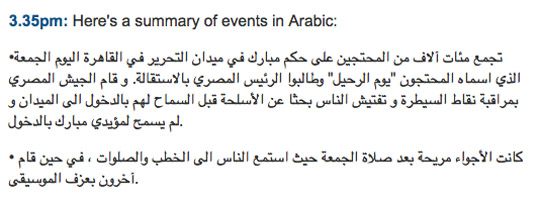Followers of the Guardian’s Egypt protests live blog in the last few days may have noticed short passages of Arabic text appearing amid the blog’s customary roster of updates, summaries and other multimedia.
Then later an entire news article or two appearing on the site in the unfamiliar language.
I spoke to blogs editor Matt Wells about the decision to translate the Guardian’s coverage into Arabic.
It began a few days back when one of the newspaper’s journalists suggested embedding Google’s translate button, which automatically translates any webpage, into the live blog. With independent news organisations such as Al Jazeera harassed by the state and foreign journalists reportedly suffering obstruction and detention, impartial Arabic-language news is not necessarily readily available in Egypt.
“The news there is dominated by state-run media,” Wells said, “and unofficial sources are mostly in English or under-resourced.”
Online translation services, however, are generally not very accuarate, even if Google has come a long way since the early days of Yahoo’s BabelFish.
The Guardian asked a native Arabic speaker in the office to take a look, and she confirmed that it “wasn’t exactly 100 per cent accurate”.
Then the blogs team put it to the readers, asking, what do you think of the Google translate service? We’ve had our native Arabic speaker cast her eye over it and don’t think it’s accurate enough.
Proving that reader comments aren’t the trash they get slated as by some, one reader joined the dots that the staff hadn’t.
If you have a native Arabic speaker, why don’t you translate some of it yourself?, they asked.
And so the Guardian started publishing live blog summaries in Arabic, and will be translating two or three news articles a day with the help of a professional service, Wells said.
“Clearly we are not going to become an Arabic news service, but we saw it as a useful feature.
“It is more of a gesture to our readers to show that we are appreciative of our audience in that region and of the fantastic response we’ve had.”
Wells said that the Guardian’s commitment to community management was key to the live blogging strategy, especially with coverage like that of the Egypt protests. The paper has two dedicated community managers – Laura Oliver and James Walsh – who sit and work with the news teams but “have the specific brief of engaging with readers in the comments below the line and on Twitter.”
That means flagging up useful information posted by users, pulling material into the live blogs from elsewhere and responding to comments or letting reporters know when it might be best for them to do so. It is a role that the Guardian is serious about developing, Wells said.
“It results in a much more engaged and two-way conversation with the users.”
As for the live blogging, there is no doubt that the Guardian likes, and does a lot of it. With more than 250,000 hits a day for the Egypt live blog alone, Wells called it the “centrepiece” of the paper’s coverage.
“This time it really feels like we’ve pushed on the form again.”

Pingback: Tweets that mention The Guardian’s Matt Wells on live blogging the Egypt protests, in Arabic | Journalism.co.uk Editors' Blog -- Topsy.com